M4U2 Holidays
外研版英语七年级下册M4U2

Look at the sentences, complete the sentences with so. 例: Working hours will be short. People will have long holidays. Working hours will be short so people will have long holidays.
Check (√ ) the true sentences. (×) 1. People have to change clothes in hot
weather. (√ ) 2. The weather will be warm in spring. (√ ) 3. A lot of people will travel by plane so
The sea level will rise as well. 海平面也会升高。
句中的 “as well”表示“也,又”,常用 于句
Th子e末lit尾tle。gi例rl 如sin:gs, and plays the piano as well. 这个小女孩既会唱歌,又会跳舞。 He can speak English, and speak Chinese as well. 他既会说英语,又会说汉语。
air land job machine rain robot sea space traffic jam wind
Match the paragraphs with the headings.
1. Weather [ B]
3. Jobs
[D ]
2. Clothes [ A] 4. Travel [ C]
maybe there will be traffic jams in the air. (√ ) 4. People will have long holidays because machines will do heavy work.
M4U2-Our-favourite-festival-is-the-Spring-Festival

教学设计
课题
Module4 Unit 2 Our favourite festival is the Spring Festival.
课时
1
教学目标
1.知识与技能:
(1)掌握the Gragon Boat Festival, the Mid-Autumn Festival, the Spring Festival and the Lantern Festival等中国传统节日名称。
Step 5Homework.
know more aboutthe history of the four festivals.
课后反思:
Students are interested in Chinese traditional festivals. They are happy to talk about this topic. In this class, I have achieved my teaching goals, through my teaching, students have learned more about Chinese traditional festivals, and they can talk about their favourite festivals. Apart from that,they want to spread our traditional culture. But it’s a bit difficult for them to read the name of the festivals, so they need more practice after class.
外研版九上Module 2 Public holidays知识点总结
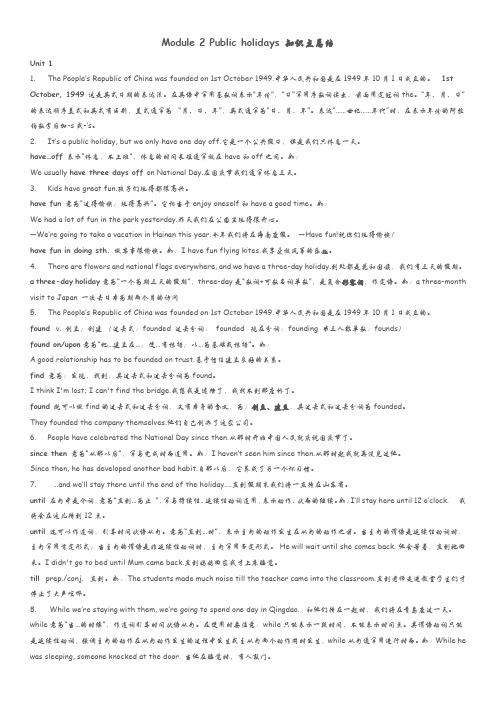
Module 2 Public holidays 知识点总结Unit 11.The People’s Republic of China was founded on 1st October 1949.中华人民共和国是在1949年10月1日成立的。
1st October, 1949 这是英式日期的表达法。
在英语中常用基数词表示“年份”,“日”常用序数词读出,前面用定冠词the。
“年、月、日”的表达顺序美式和英式有区别,美式通常为“月、日、年”,英式通常为“日、月、年”。
表达“……世纪……年代”时,在表示年份的阿拉伯数字后加-s或-’s。
2.It’s a public holiday, but we only have one day off.它是一个公共假日,但是我们只休息一天。
have…off 表示“休息,不上班”,休息的时间长短通常放在have和off之间。
如:We usually have three days off on National Day.在国庆节我们通常休息三天。
3.Kids have great fun.孩子们玩得都很高兴。
have fun 意为“过得愉快;玩得高兴”。
它相当于enjoy oneself和have a good time。
如:We had a lot of fun in the park yesterday.昨天我们在公园里玩得很开心。
—We’re going to take a vacation in Hainan this year.今年我们将在海南度假。
—Have fun!祝你们玩得愉快!have fun in doing sth. 做某事很愉快。
如:I have fun flying kites.我享受放风筝的乐趣。
4.There are flowers and national flags everywhere, and we have a three-day holiday.到处都是花和国旗,我们有三天的假期。
M4 U2 Holidays公开课

7. You will go to Hainan Island by train.( F)
8. You will stay with relatives in Australia.( F)
Homework
1.Read and recite the phrases. 2. Copy the phrases twice. 3.Write 6 sentences about your holiday plan.
2.The visit is going to start in the afternoon.
3. I’m going to have lunch in the park.
4. He is going to visit the Prince Park at 6:30.
5. Linda ______ (visit) her grandma this coming weekend. 6. Peter and I ________ (dance) at home tonight.
to Hainan Island Stay: on the boat
5 days /by boat ¥2,000
to Guangzhou
Stay: 3-star hotel
4 days/by
train
¥2,200
Stay : 4-star hotel 6 days/by plane ¥6,500
Holidays
2003,February
日
一
二
三
四
五
六
1春节
2 9 16 23
3 10 17 24
4 11 18 25
5 12 19 26
外研版七年级下册英语M4U2

Life will be better!
A better future needs
your bold imagination (大胆 想象)
Homework
• Make a poster(海报) about life in the future.
将会有
No,there won't .
∨ ∧
∨
There _w_o_n_'t__b_e_
There w__il_l _b_e___
traffic jams in the street. traffic jams in the air.
ØFast-reading 给...起小标题
Read and name headings for each paragraph .
A
clothes
B
weather
C
travel
D
jobs
ØCareful-reading
Read Part A clothes and answer.
1.What will clothes be like ?
The clothes will be warm when we're cold,and cool when we're hot.
and wind
There will be no more... It will be ... So the sea level will ...
cities in the sea
the city of the future houses on the sea
Ø Careful-reading
Read partC Travel and answer.
新外研版六年级英语上册M4U2..ppt

• What is your favourite festival?
• Spring Festival My favourite festival is Spring festival. We eat a big family dinner . We -----------------------------------------------------
ragon boat 龙舟
dragon boat race/reisstival
龙舟节\端午节
但愿人长久,千里共婵娟。
moon
月 亮
moon cake
月饼
Mid-Autumn Festival
中秋节
Spring Festival
春节
dumpling
• 14、Thank you very much for taking me with you on that splendid outing to London. It was the first time that I had seen the Tower or any of the other famous sights. If I'd gone alone, I couldn't have seen nearly as much, because I wouldn't have known my way about.
。2020年6月20日星期六2020/6/202020/6/202020/6/20
• •
THE END 15、会当凌绝顶,一览众山小。2020年6月2020/6/202020/6/202020/6/206/20/2020
16、如果一个人不知道他要驶向哪头,那么任何风都不是顺风。2020/6/202020/6/20June 20, 2020
Module 2 Public holidays知识总结 外研版英语九年级上册

Module 2 Public holidays②The woman teacher is among some flowers and cats. 这位女老师在一些花和猫之间。
6. in the seventeenth century在十七世纪【考点】英语世纪和年代表达法(1)世纪可以用定冠词加序数词加century表示。
eg:the eighteenth century 十八世纪(2)世纪+年代是由定冠词和基数词表示的世纪加十位整数的复数形式构成。
eg:in the nineteen thirties/1930's 在二十世纪三十年代7. die /daɪ/ v.死;死亡例:His father died five years ago.五年前他父亲去世了。
【考点】辨析die,dying和deathdying dying 既是die的现在分词,也是一个形容词,意为“将要死的,濒临死亡的”。
The doctor is operating on a dyingmonkey.death 是名词,意为“死亡”。
It was a matter of life and death.这是生死攸关的事情。
8. following/'fɒləʊɪŋ/ adj.接着的;接下来的例:the following day 第二天【考点一】following为形容词,常用来作定语,其动词形式为follow,意为“跟上”。
例:Sorry, I can't follow you. Could you speak slowly?对不起,我没有听明白。
你能说慢一点儿吗?【考点二】区分following与nextfollowing和next前常加定冠词the,the following指紧随其后的,有一定的顺序性;the next指接下来的或下一个。
1. public holiday公共假日2. Labour Day劳动节3. the People's Republic of China中华人民共和国4. be founded(被)成立;创立。
M4U2单元分析及教案
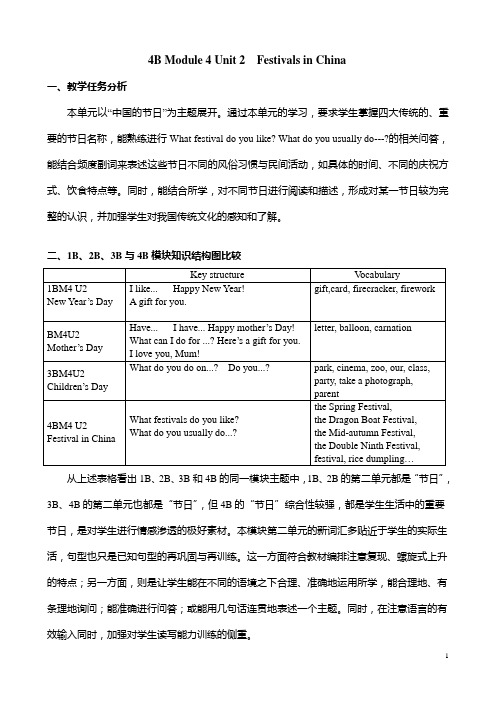
4B Module 4 Unit 2 Festivals in China一、教学任务分析本单元以“中国的节日”为主题展开。
通过本单元的学习,要求学生掌握四大传统的、重要的节日名称,能熟练进行What festival do you like? What do you usually do---?的相关问答,能结合频度副词来表述这些节日不同的风俗习惯与民间活动,如具体的时间、不同的庆祝方式、饮食特点等。
同时,能结合所学,对不同节日进行阅读和描述,形成对某一节日较为完整的认识,并加强学生对我国传统文化的感知和了解。
3B、4B的第二单元也都是“节日”,但4B的“节日”综合性较强,都是学生生活中的重要节日,是对学生进行情感渗透的极好素材。
本模块第二单元的新词汇多贴近于学生的实际生活,句型也只是已知句型的再巩固与再训练。
这一方面符合教材编排注意复现、螺旋式上升的特点;另一方面,则是让学生能在不同的语境之下合理、准确地运用所学,能合理地、有条理地询问;能准确进行问答;或能用几句话连贯地表述一个主题。
同时,在注意语言的有效输入同时,加强对学生读写能力训练的侧重。
五、分课时教学设计4B Module 4 Unit 2 Festivals in China第一课时:(P53 Say and act)辅助文本1:辅助文本1:主文本1:课时目标:1. 能正确朗读、拼写中国的传统节日如the Double Ninth Festival以及一些名词Double Ninth cakes等;2. 能运用Happy the Double Ninth Festival. 表达祝福。
3. 能灵活运用一般现在时句型的特殊疑问句进行问答,如:What do you do every day? I …4. 能熟练表演对话, 用一般现在时的句型,正确描述中国的传统节日。
5. 通过学习活动了解中国传统的节日,体验传统文化,学习优良的传统美德。
外研版英语上册M4U2

词组
• • • • The Dragon Boat race 龙舟赛 a moon cake 月饼 dragon dance 舞龙 lots of fun 许多乐趣
• • • • • • • • • • • • •
1.Happy Thanksgiving感恩节快乐 2.Flag Day国旗日 3.on Flag Day在国旗日 4.carry flags举/拿旗 5.sing songs唱歌 6.tell me more about....告诉我更多关于.... 7.American festival美国节日 8.my favourite festival我最喜爱的节日 9.on Thanksgiving day在感恩节 10.have a special meal吃一顿特别的饭 11.a big family dinner家庭大餐 12.That sounds nice.听起来很不错 13.after Thanksgiving dinner在感恩节聚餐之后
注意区分人称代词和物主代词,并 观察那些拼写相同:
• 人称代词主格宾格 我你他她它我们你们他(她、他)们 • 物主代词形容词性名词性 我的你的他的她的它的我们的你们的他(她、他)们 的 • 主格 I you he she it we you they • 宾格 me you him her it us you them • 形容词性my your his her its our your their • 名词性mine yours his hers its ours yours theirs
句型:
• What do you do on Flag Day?We carry flags and we sing songs.在国旗日你们干什么?我们 举着小旗唱歌。 • Thanksgiving Day is my favourite festival.感 恩节是我最喜爱的节日。 • We always have a special meal.It`s a big family dinner.我们总是吃一顿特别的饭。它是一 次很大的家庭聚餐。 • On Thanksgiving Day we say“thank-you”for our food,family and friends.在感恩节,我们要 对我们的食物、家人和朋友说声“谢谢你”。 • He gives presents to the children.他给孩子们 礼物。
2024年初中英语外研版m4u2教案
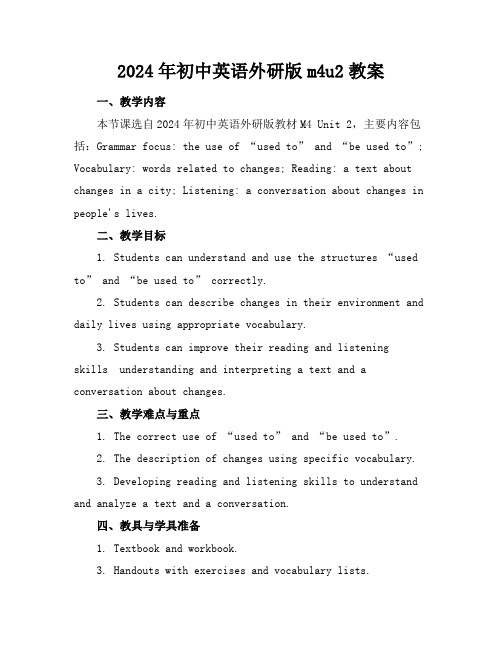
2024年初中英语外研版m4u2教案一、教学内容本节课选自2024年初中英语外研版教材M4 Unit 2,主要内容包括:Grammar focus: the use of “used to” and “be used to”; Vocabulary: words related to changes; Reading: a text about changes in a city; Listening: a conversation about changes in people's lives.二、教学目标1. Students can understand and use the structures “used to” and “be used to” correctly.2. Students can describe changes in their environment and daily lives using appropriate vocabulary.3. Students can improve their reading and listeningskills understanding and interpreting a text and a conversation about changes.三、教学难点与重点1. The correct use of “used to” and “be used to”.2. The description of changes using specific vocabulary.3. Developing reading and listening skills to understand and analyze a text and a conversation.四、教具与学具准备1. Textbook and workbook.3. Handouts with exercises and vocabulary lists.4. Answer keys for selfchecking.五、教学过程1. Introduction (5 minutes)Set a practical context showing pictures of a city before and after changes.Elicit students' ideas about the changes and encourage them to express their opinions.2. Vocabulary presentation (10 minutes)Introduce new vocabulary related to changes, using pictures and examples.Conduct activities to practice the new words, such as matching and group discussions.3. Grammar focus (15 minutes)Explain the use of “used to” and “be used to” with examples.Provide practice exercises for students to use the structures in sentences.4. Reading and listening (15 minutes)Play the listening conversation, and students answer related questions.5. Group work (10 minutes)Divide students into groups and assign tasks to describe changes using the learned vocabulary and grammar structures.6. Guided practice (5 minutes)Provide guided exercises for students to practice reading and listening skills.Offer feedback and corrections to ensure understanding.7. Production (10 minutes)Ask students to create a short dialogue or story about changes in their own lives using the learned vocabulary and grammar.Share and discuss the productions among classmates.六、板书设计1. Write the key vocabulary and grammar structures on the board.2. Use a mindmap to visually represent the changes in the city.3. Include example sentences and exercises for students to refer to during practice.七、作业设计八、课后反思及拓展延伸1. Reflect on the effectiveness of the practical context, vocabulary presentation, and group work activities.2. Consider adjustments for future lessons to enhance student engagement and understanding.3. Extend learning exploring additional resources, such as online videos or articles about changes in different cities or cultures.重点和难点解析1. 教学难点与重点的明确;2. “used to”和“be used to”的正确使用;3. 词汇的呈现与实践;4. 阅读和听力的教学过程;5. 课堂活动的组织与反馈;6. 作业设计与答案提供;7. 课后反思与拓展延伸。
外研版七年级下册M4U2学习讲义 课文翻译 重点短语句子,语法讲解

Module 4 Life in the futureUnit 2 Every family will have a small plane.一.课文翻译What will life be like in the future?未来的生活会怎样?How will things change?将会发生怎样的变化?Here are some ideas.这里有一些想法。
Which ones will come true?其中哪些会成现实呢?A:In the future, a change of weather won’t mean a change of clothes.未来,天气的变化不一定意味着更换衣服。
We’ll wear a new kind of clothes.我们将会穿一种新型的衣服。
They’ll be warm when we’re cold, and cool when we’re hot.当我们觉得冷的时候他们就会变暖和,当我们感觉热的时候他们就会变凉爽。
B:There’ll be no more light rain and cold wind in spring.在春天,不再有小雨和寒风。
The weather will be quite warm or even hot all year, with heavy rain and wind. 天气将整年都变得十分温暖甚至炎热,并伴有强风和暴雨。
The sea level will rise as well.海平面也会升高。
C:We won’t travel by bus or bike any more.我们将不会再坐公共汽车或骑自行车去旅行。
Every family will have a small plane. 每个家庭都会有一架小飞机。
No more expensive cars---it’ll be cheap to travel everywhere by plane, not only over land, but also over the sea or even into space.不会再有昂贵的汽车了——坐飞机旅行将会变得非常便宜,不仅可以在陆地上空飞行,而且还可以飞到海上甚至进入太空。
OE4BM4U2背诵内容(已修改)
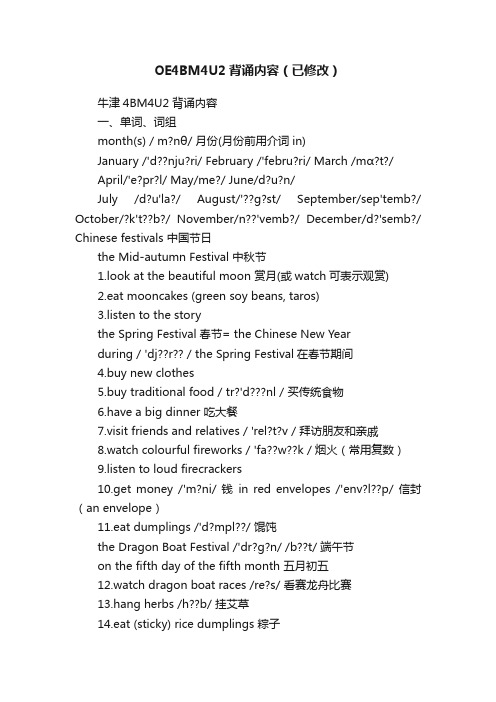
OE4BM4U2背诵内容(已修改)牛津4BM4U2 背诵内容一、单词、词组month(s) / m?nθ/ 月份(月份前用介词in)January /'d??nju?ri/ February /'febru?ri/ March /mɑ?t?/April/'e?pr?l/ May/me?/ June/d?u?n/July /d?u'la?/ August/'??ɡ?st/ September/sep'temb?/ October/?k't??b?/ November/n??'vemb?/ December/d?'semb?/ Chinese festivals 中国节日the Mid-autumn Festival 中秋节1.look at the beautiful moon 赏月(或watch可表示观赏)2.eat mooncakes (green soy beans, taros)3.listen to the storythe Spring Festival 春节= the Chinese New Yearduring / 'dj??r?? / the Spring Festival在春节期间4.buy new clothes5.buy traditional food / tr?'dnl / 买传统食物6.have a big dinner 吃大餐7.visit friends and relatives / 'rel?t?v / 拜访朋友和亲戚8.watch colourful fireworks / 'fa??w??k / 烟火(常用复数)9.listen to loud firecrackers10.get money /'m?ni/ 钱in red envelopes /'env?l??p/ 信封(an envelope)11.eat dumplings /'d?mpl??/ 馄饨the Dragon Boat Festival /'dr?ɡ?n/ /b??t/ 端午节on the fifth day of the fifth month 五月初五12.watch dragon boat races /re?s/ 看赛龙舟比赛13.hang herbs /h??b/ 挂艾草14.eat (sticky) rice dumplings 粽子the Double Ninth Festival /'d?bl/ /na?nθ/ 重阳节on the ninth day of the ninth month 九月初九15.visit old people in the old people’s home 敬老院16.climb mountains 登高17.eat Double Ninth cakes 吃重阳糕Happy the Double Ninth Festival! 重阳节快乐!其它:18.talk about festivals in China 谈论中国的节日19.the students in Class 3 Grade 4 四年级3班的学生20.on New Year’s Eve 在除夕夜21.good table manners /'m?n?/ 餐桌礼仪22.blow bubbles /'b?bl/ 吹泡泡23.talk with your mouth full 满嘴食物说话24.run around 到处跑25.learn painting 学画画learn doing sth 学做某事二、重点句型*在各种节日前,介词用at,即:at the Mid-autumn Festivalat the Dragon Boat Festivalat the Double Ninth Festivalat the Spring Festival (during the Spring Festival)*对于节日进行划线提问,用疑问词what/which festival,即:I like the Spring Festival. – What festival(s) do you like?– Which Chinese festival do you like? (which比what的范围更小、更细)*基数词和序数词,其中序数词表示顺序,第几,即:one—first two—second three—third four-fourth five—fifth six--sixth seven—seventh eight—eighth nine—ninth ten—tenth The introduction of the festival 选择一个节日,按照以下问题提示,进行相关描述。
M4U2 重点单词讲解

M4U2 重点单词讲解1.sports events/centre/day/equipment 体育赛事/体育中心/运动日/体育器材sportsman / sportswoman2.play a role in = play a part in 在…中起作用,扮演角色(常搭配central/important/key/leading/major/significant/vital)the leading role = the starring role 主角3.the International Olympic Committee 国际奥委会4.be delighted to do sth =do sth in/ with delight 高兴地做某事I was delighted to see my old friends again.be delighted that 从句I was delighted that you could stay.be delighted with/ at/ by sth 因为…而高兴The company is delighted at the reaction to its advertisement.delightful adj. 令人愉快的delight n. 高兴,愉快to one’s great delight = much to one’s delight5.significance n. 重要性,意义---- significant adj. 重要的be of great significance = be very significantI couldn’t grasp the full significance of what he said. 我不能充分领会他话的意思。
6.tradition (n.) ---- traditional (adj.)by tradition = according to tradition 照传统,根据口传cultural tradition 文化传统pete (v.) --- competition (n.) --- competitor (n.) --- competitive (adj.)compete in the football game 在足球赛中竞争compete for the championship 为冠军而竞争compete with/against them in price 在价格上与他们竞争take part in the competition 参加竞赛8.in honor of 为向…表示敬意show honor to sb = show respect for sb = honor sbhave the honor to do sth = have the honor of doing 有荣幸做某事honor ( v./ n) ---- honorable (adj.) 光荣的,可敬的,高尚的9.male --- female10.nation (n.) 国家,民族--- national ( adj.) 全国性的11.the contemporary art/ Olympics 当代艺术/现代奥林匹克运动be contemporary with 与…是同时代的12.well-known atheletes 著名的运动员as is well-known= as is known to allIt is well-known that = It is known to all that13.…of all time 一直…;有史以来at a time 每次,一次at one time 曾经,一度,过去at no time 从来没有(表强调)at times 有时at this time = at the moment 现在,此时all the time 不断地…;老是…e to public attention 受到公众的注意come to a conclusion = draw a conclusion 得出结论when it comes to 当谈到…时come to life 栩栩如生;生动;苏醒come to an end 结束come to oneself 恢复知觉,恢复正常attract/draw/catch one’s attention 吸引某人的注意力15.light the Olympic flame 点燃奥运圣火burst into flames 燃烧起来be in flames 在燃烧light ---lighted/lit---lighted/lita lighted candle 一根点燃着的蜡烛(lighted作前置定语)She lit a candle. 她点了根蜡烛(lit做谓语)16.at the opening ceremony 在开幕式上17.absence (n.) ----- absent (adj.) 缺席,不在场be absent from the meeting 缺席会议be present at the meeting 出席会议absence of mind 心不在焉,精神不集中The boss was very angry with him at his absence from work.18.excite (vt.) ----excited/exciting (adj.) ---- excitement (n.)The good news excited all the students present.19.lead the way 领先;引路;带头做某事He turned and led the way downstairs. 他转身带头下楼。
5bm4u2 ewstern holidays教案

5AM4U2 Western holidays第一部分:单元整体教学设计■教材分析■单元目标●知识与技能1.正确背记、理解和运用单词:Christmas, Easter, Halloween, Thanksgiving, find,hide,holiday, present,能在文本中了解fancy-dress party, go-trick-or-treating, hunt , jack-o’-lantern, monster, play a trick, pumpkin, turkey的意思;2.能够运用一般现在时表达或描述一个现象或事情,如西方的某一节日:Everyone in the UK likes Christmas. People often/ usually…3.正确运用What’s your favourite holiday?和What do people do on/at ...?及其回答及其答句进行会话交流;4.能够听懂和读懂I’m great, thanks.及其应答。
●方法与策略1.以对话为途径,在语境中边学边练,边学边用;2.以听读为手段,在语篇中加深对西方节日的了解;3.以问题为依托,引发思考,提升思维品质;4.以提高学习兴趣为目的,在语境中,边做边学边说,并提高动手能力。
文化与情感1.感知英语国家的节日文化,感知中西文化的差异板书设计作业设计Homework1. Read and copy thenew words.2. Introduce theWestern holidayHomework:1. Read P622. Talk about Easterwith your friends.Homework:1.Read P64、66、672.Talk aboutHalloween with yourfriendsHomework:1. Read and copy thesentences.2. Introduce yourfavourite festival/holiday to your friendand write it down.单课教学设计Procedure Content Method PurposePre-taskpreparationWarming-up 1. Sing a song.2. Ask and answer营造宽松的学习氛围,使学生快速调整状态,投入到学习过程中。
方建华M4U2 Festivals in China(教案)
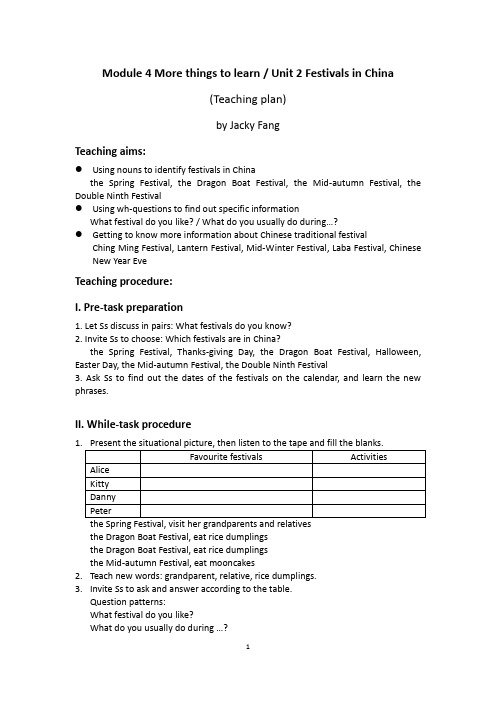
Module 4 More things to learn / Unit 2 Festivals in China(Teaching plan)by Jacky FangTeaching aims:●Using nouns to identify festivals in Chinathe Spring Festival, the Dragon Boat Festival, the Mid-autumn Festival, the Double Ninth Festival●Using wh-questions to find out specific informationWhat festival do you like? / What do you usually do during…?●Getting to know more information about Chinese traditional festivalChing Ming Festival, Lantern Festival, Mid-Winter Festival, Laba Festival, Chinese New Year EveTeaching procedure:I. Pre-task preparation1. Let Ss discuss in pairs: What festivals do you know?2. Invite Ss to choose: Which festivals are in China?the Spring Festival, Thanks-giving Day, the Dragon Boat Festival, Halloween, Easter Day, the Mid-autumn Festival, the Double Ninth Festival3. Ask Ss to find out the dates of the festivals on the calendar, and learn the new phrases.II. While-task procedure1.the Dragon Boat Festival, eat rice dumplingsthe Dragon Boat Festival, eat rice dumplingsthe Mid-autumn Festival, eat mooncakes2.Teach new words: grandparent, relative, rice dumplings.3.Invite Ss to ask and answer according to the table.Question patterns:What festival do you like?What do you usually do during …?What festival do you like? Also can be said:What’s your favourite festival?Which Chinese festival do you like?4.Ask Ss to open the book and prepare for a short play on p.52 in 6 each group.The Narrator, Miss Fang, Alice, Kitty, Danny, Peter5.Elicit the topic of ‘the Spring Festival’and finish the exercises after reading thepassage.T: The Spring Festival is the most important festival in China. It usually comes in January or February.at the beginning of the new year, before the Spring Festival, at night, on New Year’s Eve6.Ask Ss to choose: What do you do during the Spring Festival?T: As we know, we usually visit our relatives, grandparents, or friends. What else do you do during the Spring Festival?visit our relatives, grandparents, or friendsbuy new clothes and traditional foodhave a big dinner and eat dumplingsget lucky money in red envelopeswatch the lantern showclimb the mountainwatch colourful fireworks at nightsweep the tombs or have a spring trip7. In addition, invite Ss to tell what festival the other activities belong to.watch the lantern show → the Lantern Festivalclimb the mountain → the Double Ninth Festivalsweep the tombs or have a spring trip →the Ching Ming Day / the Tomb-sweeping DayIII. Post-task activities1.Group work: Please fill the table with the following items while reading thepassge ’Chinese traditional festivals’.Dragon Boat Festival Ching Ming Festival Lantern Festival Mid-Autumn Festival Double Ninth Festival Mid-Winter Festival Laba Festival Chinese New Year Eve Spring FestivalInvite one in each group to report the result.2.Assignments:Read the text on p.54 and do the exerciseWrite a plan for a festival party2011.05.17。
外研版八下英语M4U2

Read the sentences given one by one, if you make
mistakes, just stop and the next student will
continue. The fastest line will be the winner.
•A篇 BACAD •B篇 1.T; 2.F; 3.F; 4.F; 5.T; •C篇1. Because he couldn"t sleep well every night 2. No, there wasn"t/ No, there was nothing wrong 3. The doctor told him to keep counting./ The doctor told him to count from one to ten again and again. 4. He felt/ was worse than before. 5. He was a boxer.
Contents and Prep – Pages 1 – 2 : Ailment cards – Cut them out and laminate if possible, or glue them on cardstock.
Pages 2 – 3 : Instructions
Are they healthy ?
1. Introduce your or your parents’ healthy living. 2. Try to use Present Perfect Tense.
have a stuffy nose / feel bad
have a sunburn / feel painful
(完整版)高一下英语-M4U2

Module 4 Unit 2 Sporting Events新课标单词sporting adj 体育的,运动的honourable adj 光荣的,可敬的,高尚的delighted adj 愉快的,高兴的,欣喜的significance n 重要性,重要意义briefly adv 简要地,扼要地wrestling n 摔交(运动)running n 跑,跑步athlete n 运动员compete vi 比赛,竞争unmarried adj 未婚的separate adj 单独的,分开的,不同的honour n 尊敬,敬意god n 神,偶像restart vt 重新开始peacefully adv 和平地;平静地,安宁地well-known adj 著名的,闻名的medal n 奖牌,奖章,勋章,纪念章gladly adv 高兴地,乐意地light vt 点燃,照亮flame n 火焰ceremony n 仪式,典礼superstar n 超级明星scorer n 得分运动员,得分选手record n 记录run n 跑,赛跑contribution n 贡献absence n 缺席,没参加,不在场female adj 女子的,女性的table tennis 乒乓球excite vt 使兴奋,使激动Asian n 亚洲人adj 亚洲的joy n 喜悦,欢乐attempt n & vt 尝试,努力limit n 极限,界限,限度movement n 运动,移动glorious adj 光辉的,光荣的,荣耀的international adj 国际的state vt 陈述,说明retire vi 退役,退休host vt 主办;主持stadium n 体育馆first-class adj 一流的,最好的itself pron 它自己plenty of 许多,大量transport n 交通运输系统;运输attraction n 吸引人的地方或事情bid n 申请,争取fan n 爱好者,迷pretty adv 相当,颇coach n 教练otherwise adv 否则,要不然swimmer n 游泳者origin n 起源,来由outdoors adv 往户外,在户外physical adj 身体的,肉体的technique n 技术,技法,技巧opponent n 对手,竞争者leading adj 主导的role n 作用,地位,(演员的)角色activity n 活动joke vi 开玩笑requirement n 要求meet vt 满足(需要等),达到(要求等)practice vt 从事,经常做,实践association n 协会ensure vt 保证remove vt 去除,去掉;移开,拿开previous adj 先前的,早前的supporter n 支持者,拥护者branch n 分支,分部balance n 平衡involved adj 涉及的,卷入的课文出现短语1. play a role in2. be delighted to3. share sth with sb4. save time for5. every four years6. allow sb to do sth7. take part in8. in honour of9. from around the world10. side by side11. all over the world12. realize one’s dreams13. come to public attention14. under one’s original name15. the opening ceremony16. know of sb / sth17. compete for18. recognize sb / sth as19. break the world record20. make contributions to 21. one’s attempt to do sth22. the limits of23. look forward to sth / doing24. join sb in doing25. get sth doing26. be related to27. enter sth into\28. meet on e’s requirements29. keep sth under control30. make way for31. involve in32. hope for33. group into34. come up with35. host the Olympics36. protect sb / sth from37. follow one’s advice38. change one’s mind39. the answer to a question40. look out for重点单词【1】allow vt.允许,准许allow (doing) sth. 允许(做)某事We don't allow eating in the classroom.(我们)不允许在教室吃饭。
外研版八年级上册M4U2 ppt课件

外研版八年级上册M4U2
journey n. 旅行; 旅程 book v. 预定 e.g. book a table 订餐桌
book a ticket 订票
外研版八年级上册M4U2
park v. 停; 放(车); 泊(车) e.g. You’re not allowed to park in this
Ways of Good points Bad points
travelling
more
more
Train relaxing expensive than
than by by coach
coach
外研版八年级上册M4U2
Ways of Good points Bad points travelling
外研版八年级上册M4U2
2. Mrs Zhang is one of ______ teachers in our
school. We all like her.
A. popular
B. more popular
C. the most popular
3. —Who ran ______ of all in the sports
外研版八年级上册M4U2
2) Dear students, please read every sentence carefully. _______ you are, ________ mistakes you’ll make. A. The more carefully, the fewer B. The more careful, the less C. The more carefully, the less D. The more careful, the fewer
- 1、下载文档前请自行甄别文档内容的完整性,平台不提供额外的编辑、内容补充、找答案等附加服务。
- 2、"仅部分预览"的文档,不可在线预览部分如存在完整性等问题,可反馈申请退款(可完整预览的文档不适用该条件!)。
- 3、如文档侵犯您的权益,请联系客服反馈,我们会尽快为您处理(人工客服工作时间:9:00-18:30)。
M4U2 Holidays
一、单词:
brochure小册子, holiday brochure旅游指南, forecast预报, holiday假日, how long多久relative亲戚, river河流, sandal凉鞋, shorts短裤, snowy下雪的, stay 停留, then然后, ticket票, snow雪, trip旅行, go on a trip去旅游
二、词组:
1.游河go on a river trip
2. 在四星级酒店stay at a 4-star hotel
3.乘中国东方航空到桂林fly on China Eastern to Guilin
4.在春节at Chinese New Y ear
5. 多久How long
6.待上三天stay for three days
7. 待在假日旅馆stay at a Holiday Inn
8.待在船上stay on the boat
9. 和亲戚一起with relatives
10.围巾和手套scarves and gloves 11. T恤和短裤T-shirts and shorts
12. 凉鞋、赤脚sandals and no socks
13. 足够温暖warm enough(形容词+ enough)
14. 足够多的钱enough money (enough+ 名词) 15. 买票get the tickets 16. 每人30元thirty yuan per person
三、句子:
1. 他们将在那里呆多久?一个月。
How long will they stay there? For a month.
2. 这里是春节期间的天气预报。
Her e is the weather forecast for Chinese New Y ear.
3. 本,你需要多少钱?Ben, how much do you need?
4. 我们将在桂林干什么?水上游览。
What will we do in Guilin? Go on a river trip.
5. 西安将非常冷,而且有雪。
Xi’an will be very cold and snowy.。
